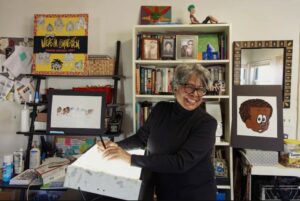A Trailblazer Who Brought a Black Woman’s Voice to Comics
Barbara Brandon-Croft wrote a pitch that, 34 years later, has lost none of its punch.
“Few Black Cartoonists have entered national syndication since the 1970s,” began the boldfaced heading to her letter to newspaper syndicates. “None have been Black Women.”
What Brandon-Croft was offering the gatekeepers of such mass distribution was not a shaming as much as a way to course-correct. They could overcome their lack of representation while also reaching new audiences. “We all gain from the Black experience,” she wrote in the letter. “Moreover, everyone’s to gain from the Black female experience in particular.”
Her precise verbal strike caught the eye of legendary Universal Press Syndicate editor Lee Salem, who had nurtured such strips as “Calvin and Hobbes” and “Cathy” and later discovered “The Boondocks.” He knew excellence when he saw it, replying to her: “It’s rare to have such a good ear for nuance and character.” She was on her way.
As the next decade dawned, she became the first African American woman ever to have a comic strip, “Where I’m Coming From,” syndicated to the mainstream press.
The trail Brandon-Croft blazed is being celebrated in a beautiful hardcover retrospective, “Where I’m Coming From: Selected Strips, 1991-2005,” hitting shelves and e-sales Tuesday. The overdue salute not only provides a nostalgic trip through the lives of Brandon-Croft’s nine central female characters; the book also includes essays and letters that spotlight just how unique her achievement was.
“I felt like I was pushing against history,” the Queens-based Brandon-Croft says last month during a Zoom interview. Yet she was undaunted in her early 30s, a fledgling Detroit Free Press cartoonist who wasfull of “nerves and spunk.”
She also drew strength from knowing how much her voice needed to be heard through comics. The once-shy Brandon-Croft speaks with great warmth when she says: “I felt entitled to make this happen.”
